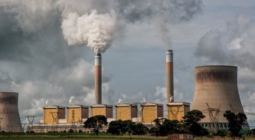Sir David King, chair of the UK’s Climate Crisis Group, said the COP30 decision failed “the most basic test: does it secure a manageable future for humanity. A credible pathway to phase out fossil fuels must be at the heart of any outcome here. As we move deeper into climate overshoot, the world cannot expect the most vulnerable countries to carry the burden while finance and support keep shifting out of reach.”
Failure on Fossil Fuels
The absence of any language on a fossil fuel phaseout was by far the most glaring gap in the final COP decision.
On Wednesday, UN Secretary General António Guterres identified Saudi Arabia as a key obstacle to a deal. “I think the issue is the emissions, it’s not the fuel,” the country’s deputy environment minister Osama Faqeeha told Carbon Brief. “And our position is that we have to cut emissions regardless.”
Saudi Arabia “has long resisted attempts to discuss the shift away from fossil fuels at global climate talks despite signing up two years ago to an agreement in Dubai at COP28 for a transition from oil, gas, and coal by 2050, along with almost 200 countries,” the Financial Times writes. Since that decision, “oil and gas producers and some other large consumer countries have insisted the continued use of fossil fuels will be required to meet global energy needs, bolstered by… Donald Trump’s [likely doomed] fossil fuel push on his return to office.”
In the end, the final COP30 decision “exposed rifts between wealthy and developing nations, as well as between those governments with opposing views on oil, gas, and coal,” Reuters wrote. “The European Union had been the main holdout for language on a transition away from fossil fuels, but ultimately agreed to drop it after a coalition of countries including top oil exporter Saudi Arabia said it was off-limits.”
“It’s crystal clear that it was an intense and sometimes difficult week and also evening,” EU climate commissioner Wopke Hoekstra told media in Belém Saturday morning. “There’s a lot that we would have liked to have more,” he said. “Climate and climate change needs more battling, more action, more delivery. And that is why we have been pushing for that, because the EU needs more, because the world needs more.”
But in the end, “we should support (the deal) because at least it is going in the right direction,” he added.
“A climate decision that cannot even say ‘fossil fuels’ is not neutrality, it is complicity,” retorted Panama’s Special Representative for Climate Change Juan Carlos Monterrey. “What is happening here transcends incompetence.”
German environment minister Carsten Schneider said he was “a little disappointed” the COP was silent on a process for phasing out fossil fuels. He pledged that Germany and the EU would continue building alliances on the issue, describing the COP30 decision as “by no means a step backward, but rather an intermediate step.”
But “not all countries will be disappointed in the outcome tonight,” the BBC’s McGrath observed. “Those who are large producers of fossil fuels or whose economies are dependent on them will welcome the pause in ambition.”
“As COP30 ends, the reality is clear: bold titles and grand promises have not translated into meaningful action. The so-called ‘COP of Truth’ delivered neither a roadmap nor real solutions for the urgent challenges we face,” said Manuel Pulgar-Vidal, WWF’s global climate and energy lead, who previously served as president of the COP20 climate summit in Peru.
“Instead, we were taken for a ride on a carousel of illusions—distracted by colourful promises but left with a document that is weak and lacking in substance due to games played by the forces against climate ambition and implementation.”
Climate Analytics CEO Bill Hare said the COP “didn’t deliver the bold fossil fuel phaseout roadmap that is needed, but it has nudged the system forward: more scrutiny of fossil fuel producers and more money for forests and adaptation, and a new, rising emphasis on trade and implementation.”
With the traditional COP model “under serious strain in a fractured, multipolar world, particularly from countries prepared to sacrifice the well-being of the world for fossil fuel interests,” Hare said it was “significant that the Brazilian presidency will move forward process on developing a roadmap for a transition away from fossil fuels, and that more than 90 countries support this.”
That process is “weaker than it should be,” he added, “because of the opposition of countries who don’t want to move forward.”
Finance, Forests, and Just Transition
COP30 had been signposted as an implementation conference, and Financial Times reporter Pilita Clark praised the event as a “COP like no other”, a “shift away from showy pledges to tackling the real world complexities of cutting emissions.” That assessment was “way more insightful than most on the underlying trend here at COP30,” Rachel Kyte, the UK’s special representative for climate, wrote on LinkedIn.
The COP decision gives wealthier countries until 2035 to at least triple the financing they make available for climate adaptation—COP-speak for the funds developing countries need to counter front-line climate impacts like sea level rise, heat waves, droughts, severe storms, and flooding. Developing countries that have contributed the least to global climate pollution but are seeing the worst impacts of climate change have been saying continually that they needed those funds yesterday—but the last time rich countries gave themselves an extended deadline to meet a climate finance pledge, they missed it by years.
This time around, “I fear the world still fell short on more rapid-release grants for developing countries responding to loss and damage,” said Avinash Persaud, special advisor to the president of the Inter-American Development Bank. “That goal is as urgent as it is hard.”
Climate Action Network International described the adaptation decision as a “grim outcome” that fell far short of what vulnerable countries needed and expected from COP30.
“The watering down of the obligations of developed countries to provide adaptation finance, and pushing the timelines to deliver the tripling of finance to 2035, is a betrayal of vulnerable and impacted people in the Global South and driven mainly by the EU and Japan,” CAN wrote in a release.
But the global network [with which Energy Mix Productions affiliates through its membership in Climate Action Network Canada] declared a hard-fought victory on the Belém Action Mechanism (BAM), a just transition mechanism to support workers and communities that are adversely affected by the shift off fossil fuels.
CAN welcomed the BAM as a “breakthrough for rights and justice” and “one of the strongest rights-based outcomes in the history of the UN climate negotiations,” adding that “more ambition on climate is possible if we put social justice at the heart.”
Earlier in the negotiations, “the proposal to establish a dedicated global facility won backing at the climate talks from the largest group of developing nations, the G77+China,” Climate Home News reported. “Under the proposal, developing countries would receive financial and technical assistance aimed at ensuring a fair transition to clean energy.”
But late last week, CAN said Canada, the UK, Norway, Australia, and the EU were all pushing back on the plan. “Basically these countries do not want any new or innovative way of bringing the just transition community together,” Anabella Rosemberg, CAN’s senior just transition advisor, explained at the time.
But the last rounds of negotiations pushed the BAM into the final Belém declaration. “No COP decision has ever carried such ambitious and comprehensive language on rights and inclusion: human rights; labour rights; the rights of Indigenous Peoples, Afro-descendants; and strong references to gender equality, women’s empowerment, education, youth development, and more,” the CAN release stated.
Elsewhere, COP30 President Do Lago “did announce two ‘roadmaps’ on deforestation and one on transitioning away from fossil fuels, but these are mostly a sop to the audience here who desperately wanted those issues mentioned in the main text but couldn’t overcome the objections of others including Saudi Arabia, Russia, and India,” the BBC’s McGrath wrote. “These ‘roadmaps’ have no legal standing and are little more than a crumb of comfort. As one observer said—they’d never seen so many people so underwhelmed by so little progress at a COP.”
Separately, the BBC cited a series of commitments on deforestation, including a $6-billion rainforest protection fund launched by Brazil that received nearly $6 billion in pledges, a $2.5-billion conservation scheme for the Congo Basin led by France and other EU countries, and recognition of four new Indigenous territories in Brazil. Those announcements had Toerris Jaeger, executive director of Rainforest Foundation Norway, praising Brazilian President Luiz Inácio Lula da Silva for delivering a COP that “summoned both money and political will” for forest protection.
The COP agreement “also launches a process for climate bodies to review how to align international trade with climate action,” Reuters said, “amid concerns that rising trade barriers are limiting the adoption of clean technology.”
In the end, “COP30 delivered breakthroughs to triple adaptation finance and protect the world’s forests, and it elevated the voices of Indigenous Peoples like never before. This shows that even against a challenging geopolitical backdrop, international climate cooperation can still deliver results,” said World Resources Institute President and CEO Ani Dasgupta.
“But many will leave Belém disappointed that negotiators couldn’t agree to develop a roadmap to transition away from fossil fuels. More than 80 countries stood their ground for a fair and equitable shift off fossil fuels, but intense lobbying from a few petrostates weakened the deal.”
Momentum Outside the COP Process
Speaking from the G20 summit in South Africa, Lula praised the final COP30 deal, saying “science prevailed, multilateralism won,” the BBC reported.
“In the year when the planet surpassed for the first time—and perhaps permanently—the limit of 1.5°C [average global warming] above pre-industrial levels, the international community faced a choice: to continue or to give up,” Lula declared. “We chose the first option.”
But for many COP participants, the most important results of the conference took place outside the official COP process: particularly Colombia’s and Denmark’s announcement that they will host a First International Conference on the Just Transition Away from Fossil Fuels next April 28-29 in Santa Marta, Colombia. The Brazilian COP Presidency expressed its support for that initiative during the closing plenary.
“From the heart of the Amazon, Indigenous peoples, Afro-descendant communities, campesino organizations, academia, and social movements delivered a message that we cannot ignore,” said Irene Vélez Torres, Colombia’s Minister in Charge of Environment and Sustainable Development. “As difficult as it can be, we also know that this conversation cannot end here. We must keep the momentum, lead with bravery, rise to the challenge, and build a coalition of the willing.”
“There is a clear momentum to phase out fossil fuels, and now is the time to capitalize on it,” added The Netherlands’ Deputy Prime Minister Sophie Hermans, who also serves as Minister for Climate and Green Growth. “We must begin to materialize what this phaseout could look like and start a concrete roadmap that allows us to incorporate the new and leave the old behind.”




